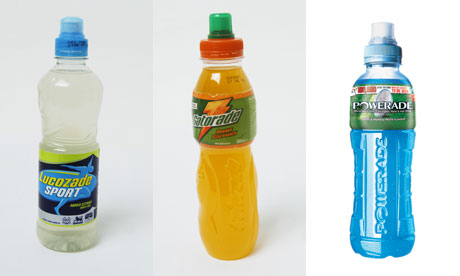
Anyone who's visited the Olympic Park won't have missed the ubiquitous branding of two of its sponsors, McDonald's and Coca-Cola. At 1pm yesterday, the queue for the world's biggest McDonald's was around an hour, and you can scarcely turn around without seeing the red-white scribble of the sugar water's logo.
In the athletes' village you'll likely see a few bottles of Powerade or Lucozade, respectively a "partner" and "service provider" to the games. Coca-Cola owns Powerade and GlaxoSmithKline (GSK) Lucozade. The allegedly vast importance of "hydration" in exercise is now almost a cliche. Many sports websites, magazines and thick-necked gym bunnies evangelise on how vital it is to drink before you're thirsty, that your body isn't good at telling you when you need to take on liquids, that water is insufficient to hydrate you, and that sports drinks do a better job.
The BMJ recently published a lengthy analysis of the science behind these claims, and the findings are important. They show how the hydration fanaticism which has gripped the sports industry since the 1980s has been established in large part through studies funded by GSK, Coca-Cola and PepsiCo, which owns Gatorade. The BMJ severely criticises much of this science, citing small sample sizes, poorly designed research, data dredging and significant financial conflicts of interest from study authors:
Three of the six authors of the updated guidance declared major financial conflicts of interest. Randy Eichner and Nina Stachenfeld had financial ties to Gatorade, and Ronald Maughan had received funding from Coca-Cola and GSK, as well as being on the GSSI review board. Louise Burke had no personal financial ties, although her institution, the AIS, received funding from Gatorade. The other two authors, Michael Sawka (chair of the committee) and Scott Montain, worked for the US military and had attended the exclusive Quaker Oats meetings in the 1990s. Even two of the five reviewers—Michael Bergeron and Mark Hargreaves—declared financial links to Gatorade.
In 1992, Gatorade donated $250,000 to the American College of Sports Medicine, the largest body of its kind, with over 45,000 members. In 1993, Gatorade and the ACSM held a "roundtable" meeting on "exercise and fluid replacement". The results of this were published in 1996 when the ACSM released guidelines claiming that athletes should strive for "0% dehydration" and "drink as much as tolerable [sic]".
In 2007, the ACSM revised its guidelines to say that people should primarily use thirst to dictate fluid intake before, during and after exercise. (This was at a time when several marathon runners had died or suffered serious complications from hyponatremia caused by overhydration.) But the guidance still maintained that people should avoid a "2% drop in dehydration" – though it did not explain how you're supposed to monitor this.
The European Food Safety Authority, partly basing its findings on the ACSM's 2007 guidelines, upholds two claims about sports drinks: that they hydrate better than water does and that they help maintain performance in athletes doing endurance exercise. But the BMJ has analysed the studies on which the EFSA based its review, finding that the evidence "does not uphold this view", and "a troubling circularity in the industry-influenced evidence base". When the paper asked GSK, Gatorade and Coca-Cola for complete lists of the studies they'd funded, only GSK was prepared to supply them.
The BMJ research suggests that, once again, marketing and bad science can establish myths in the public mind that can change its shopping habits and make millions for conglomerates. Sports drinks, if they "work" at all, work for endurance athletes, not for an ordinary person puffing about on a cross-trainer twice a week, or for teenagers having a Saturday kickabout. (GSK last year used Tinie Tempah to promote Lucozade Sport.) According to Tim Noakes, professor of exercise and sports science at Cape Town University: "Over the past 40 years humans have been misled – mainly by the marketing departments of companies selling sports drinks – to believe that they need to drink to stay 'ahead of thirst' to be optimally hydrated." It's worrying when doctors have to remind us that water is enough to quench our thirst.

